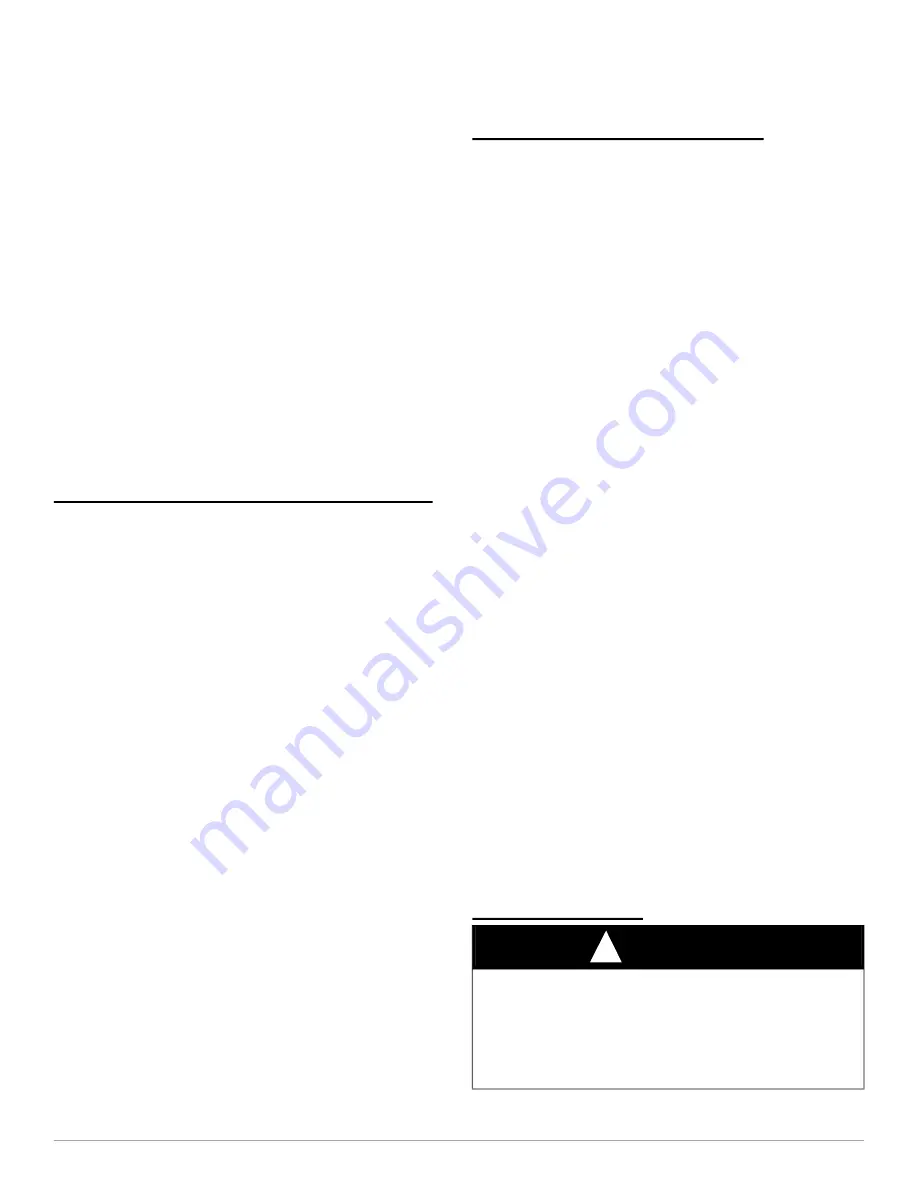
AGAGC9PNS01B Gas Conversion Kit, Propane to Natural: Installation Instructions
Manufacturer reserves the right to change, at any time, specifications and designs without notice and without obligations.
14
7. Verify manifold pressure is correct.
NOTE:
Gas valve regulator seal cap MUST be in place when checking
input rate. When correct input is obtained, main burner flame should be
clear blue, almost transparent, see
. Be sure regulator seal cap is
in place when finished.
8. Remove jumper across R and W thermostat connections to
terminate call for heat.
9. Turn furnace gas valve control switch or control knob to OFF
position.
10. Turn off furnace power supply.
11. Remove manometer and on some models remove pressure tap
fitting.
12. On some models, apply pipe dope sparingly to end of 1/8-in. (3
mm) pipe plug and install in the manifold pressure tap opening. Or,
on some models, tighten set screw on manifold tower pressure tap
with a 3/32-in. hex wrench, see
13. Turn furnace gas-valve switch to ON position.
14. Turn on furnace power supply.
15. Set room thermostat to call for heat.
16. Check pressure tap plug for gas leaks when main burners ignite.
17. Check for correct burner flame.
18. After making the required manifold pressure adjustments, check
and adjust the furnace temperature rise per the furnace installation
instructions.
Fixed-Speed Blower (FCT), Two-Stage Gas Valve
1. Verify SW1 (LHT or TT) on furnace control is turned “ON”. See
.
2. Jumper R and W/W1 thermostat connections to call for heat.
3. Check manifold orifices for gas leaks when main burners ignite.
4. Adjust gas manifold pressure, see
5. Remove caps that conceal adjustment screws for gas valve
6. Adjust low heat input rate manifold pressure for propane gas.
7. Turn low heat adjusting screw counterclockwise (out) to decrease
input rate or clockwise (in) to increase input rate.
8. When correct input is obtained, main burner flame should be clear
blue, almost transparent, see
9. Jumper R and W/W1 and W2 on control center thermostat
connections. This keeps furnace locked in high heat operation.
10. Adjust high heat input rate manifold pressure for propane gas.
11. Turn high heat adjusting screw counterclockwise (out) to decrease
input rate or clockwise (in) to increase input rate.
12. Replace caps that conceal gas valve regulator adjustment screws.
13. When correct input is obtained, main burner flame should be clear
blue, almost transparent, see
14. Remove jumper across R, W1, and W2 after high heat adjustment
to terminate call for heat.
15. Turn setup switch SW1 (TT) on furnace control to OFF position.
16. Turn furnace gas-valve switch to OFF position.
17. Turn off furnace power supply.
18. Remove manometer from the manifold pressure tap of the gas
valve.
19. On some models, apply pipe dope sparingly to end of 1/8-in. (3
mm) pipe plug and install in the manifold pressure tap opening. Or,
on some models, tighten set screw on manifold tower pressure tap
with a 3/32-in. hex wrench, see
20. Turn on furnace power supply.
21. Set room thermostat to call for heat.
22. Check pressure tap plug for gas leaks when main burners ignite.
23. Check for correct burner flame.
24. After making the required manifold pressure adjustments, check
and adjust the furnace temperature rise per the furnace installation
instructions.
Variable Speed, Two-Stage Gas Valve
1. Verify SW1-2 on furnace control is turned “ON”.
2. Jumper R and W/W1 thermostat connections to call for heat.
3. Check manifold orifices for gas leaks when main burners ignite.
4. Remove caps that conceal adjustment screws for gas valve
regulators, see
.
5. Adjust low-heat manifold pressure for propane gas, see
.
6. Turn low-heat adjusting screw counterclockwise (out) to decrease
input rate or clockwise (in) to increase input rate.
NOTE:
When correct input is obtained, main burner flame should be
clear blue, almost transparent, see
7. Jumper R, W/W1 and W2 on control center thermostat connections.
This keeps furnace locked in high-heat operation.
8. Adjust high-heat manifold pressure for propane gas.
9. Turn high-heat adjusting screw counterclockwise (out) to decrease
input rate or clockwise (in) to increase input rate.
10. Replace caps that conceal gas valve regulator adjustment screws.
NOTE:
When correct input is obtained, main burner flame should be
clear blue, almost transparent, see
..
11. Remove jumper across R, W1, and W2 after high-heat adjustment
to terminate call for heat.
12. Turn setup switch SW1-2 on furnace control to OFF position.
13. Turn furnace gas valve switch to OFF position.
14. Turn off furnace power supply.
15. Remove manometer from the manifold pressure tap of the gas
valve.
16. On some models, apply pipe dope sparingly to end of 1/8-in. (3
mm) pipe plug and install in the manifold pressure tap opening. Or,
on some models, tighten set screw on manifold tower pressure tap
with a 3/32-in. hex wrench, see
.
17. Turn furnace gas valve switch to ON position.
18. Turn on furnace power supply.
19. Set room thermostat to call for heat.
20. Check pressure tap plug for gas leaks when main burners ignite.
21. Check for correct burner flame.
22. Observe unit operation through two complete heating cycles.
23. See Sequence of Operation in furnace Installation, Start-up, and
Operating Instructions.
24. Set room thermostat to desired temperature.
25. After making the required manifold pressure adjustments, check
and adjust the furnace temperature rise per the furnace installation
instructions.
Modulating Gas Valve
For proper operation and long term reliability, the manifold pressure
must be adjusted as specified on the conversion kit rating plate.
CAUTION
!
UNIT DAMAGE HAZARD
Failure to follow this caution may result in gas valve damage.
Do not force the rotary adjustment switch on the modulating gas valve.
Do not turn the rotary adjustment switch faster than one click per
second when adjusting manifold pressure. Gas valve will be damaged if
excessive force is used on the rotary switch.


































